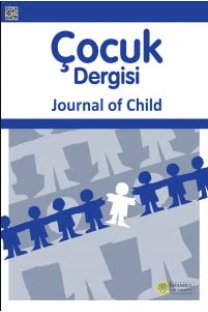Adolesanlarda Anormal Uterin Kanamaya Jinekolog Gözüyle Yaklaşım
Adolesan, anormal uterin kanama, menstrüel bozukluklar
Gynecologic Approach to Abnormal Uterine Bleeding in Adolescents
Abnormal uterine bleeding, adolescents, menstrual disorders,
___
- 1. Munro MG, Critchley HO, Broder MS, Fraser IS. FIGO classification system (PALM-COEIN) for causes of abnormal uterine bleeding in nongravid women of reproductive age. Int J Gynaecol Obstet 2011;113:3-13. http://dx.doi.org/10.1016/j.ijgo.2010.11.011
- 2. ACOG Committee on Adolescent Health Care. ACOG committee opinion no. 349, November: menstruation in girls and adolescents: using the menstrual cycle as a vital sign. Obstet Gynecol 2006;108:1323-8. http://dx.doi.org/10.1097/00006250-200611000-00059
- 3. Fraser IS, McCarron G, Markham R. A preliminary study of factors influencing perception of menstrual blood loss volume. Am J Obstet Gynecol 1984;149:788-93. http://dx.doi.org/10.1016/0002-9378(84)90123-6
- 4. Gray SH, Emans SJH. Abnormal vajinal bleeding in the adolescent. In: Emans SJ, Laufer MR, editors. Emans, Laufer, Goldstein’s pediatric, adolescent gynecology. 6th ed. Philadelphia, PA: Lippincott; 2012. pp. 159-67.
- 5. American College of Obstetricians and Gynecologists. Practice bulletin no. 128: diagnosis of abnormal uterine bleeding in reproductive-aged women. Obstet Gynecol 2012; 120:197-206. http://dx.doi.org/10.1097/AOG.0b013e318262e320
- 6. Benjamins LJ. Practice guideline: evaluation and management of abnormal vajinal bleeding in adolescents. J Pediatr Health Care 2009;23:189-93. http://dx.doi.org/10.1016/j.pedhc.2009.02.003
- 7. Shankar M, Lee CA, Sabin CA, et al. von Willebrand disease in women with menorrhagia: a systematic review. BJOG 2004;111:734. http://dx.doi.org/10.1111/j.1471-0528.2004.00176.x
- 8. Mikhail S, Kouides P. von Willebrand disease in the pediatric and adolescent population. J Pediatr Adolesc Gynecol 2010;23(6 Suppl):S3. http://dx.doi.org/10.1016/j.jpag.2010.08.005
- 9. Vo KT, Grooms L, Klima J, et al. Menstrual bleeding patterns and prevalence of bleeding disorders in a multidisciplinary adolescent haematology clinic. Haemophilia 2013; 19:71. http://dx.doi.org/10.1111/hae.12012
- 10. James AH. Bleeding disorders in adolescents. Obstet Gynecol Clin North Am 2009;36:153-62. http://dx.doi.org/10.1016/j.ogc.2008.12.002
- 11. Committee on Practice Bulletins: Gynecology. Practice bulletin no. 136: management of abnormal uterine bleeding associated with ovulatory dysfunction. Obstet Gynecol 2013;122:176- 85. http://dx.doi.org/10.1097/01.AOG.0000431815.52679.bb
- 12. Gray SH. Menstrual disorders. Pediatr Rev 2013;34:6-17.
- 13. American College of Obstetricians and Gynecologists. ACOG committee opinion no. 557: management of acute abnormal uterine bleeding in nonpregnant reproductive-aged women. Obstet Gynecol 2013;121:891-6. http://dx.doi.org/10.1097/01.AOG.0000428646.67925.9a
- 14. Frishman GN. Evaluation and treatment of menorrhagia in an adolescent population. J Minim Invasive Gynecol 2008;15: 682-8. http://dx.doi.org/10.1016/j.jmig.2008.08.014
- 15. Sokkary N, Dietrich JE. Management of heavy menstrual bleeding in adolescents. Curr Opin Obstet Gynecol 2012;24:275-80. http://dx.doi.org/10.1097/GCO.0b013e3283562bcb
- 16. Williams C, Creighton S. Menstrual disorders in adolescents: Review of current practice. Horm Res Paediatr 2012;78:135- 43 http://dx.doi.org/10.1159/000342822
- 17. American College of Obstetricians and Gynecologists. ACOG Committee Opinion No. 392, December 2007: Intrauterine device and adolescents. Obstet Gynecol 2007;110:1493. http://dx.doi.org/10.1097/01.AOG.0000291575.93944.1a
- 18. Bennet AR, Gray SH. What to do when she’s bleeding through: the recognitioin, evaluation and management of abnormal uterine bleeding in adolescents. Curr Opin Pediatr 2014;26:413-9. http://dx.doi.org/10.1097/MOP.0000000000000121
- 19. Lethaby A, Farquhar C, Cooke I. Antifibrinolytics for heavy menstrual bleeding. Cochrane Database Syst Rev 2000; CD000249. http://dx.doi.org/10.1002/14651858.cd000249
- ISSN: 1302-9940
- Yayın Aralığı: Yılda 4 Sayı
- Başlangıç: 2000
- Yayıncı: İstanbul Üniversitesi
Ventriküler Taşikardi ile Başvuran Bir Kardiyak Fibroma Vakası ve Uzun Dönem İzlemi
Serra KARACA, Özge UMUR, Gafur DOĞDU, Kemal NİŞLİ, Rukiye EKER, Oğuz Bülent EROL, Aygün DİNDAR
Anneden Bebeğe HIV Geçişinin Önlenmesi
Çocukluk Çağı Büyüme Hormonu Eksikliğinde Büyüme Hormonu Tedavisinin Optimizasyonu
Meningokoksemiye Bağlı Purpura Fulminanslı Çocuk Hastada Hiperbarik Oksijen Tedavisi
Manolya ACAR, Murat SÜTÇÜ, Ayper SOMER, Emel EKŞİ ALP, Kübranur BAŞ, Hacer AKTÜRK, Nezahat GÜRLER, Nuran SALMAN
Ebru OĞULTEKİN VAZGEÇER, Selime AYDOĞDU, Serap KARAMAN, Ömer DEVECİOĞLU, Mehmet AĞAN, Aykan ÖZGÜVEN, Ayşegül ÜNÜVAR, Sema ANAK, Zeynep KARAKAŞ
Çocuk Sağlığı İzleminde Kanserden Sağ Kalanlar
Esra DEVECİOĞLU, Gülbin GÖKÇAY, Serap KARAMAN
Adolesanlarda Anormal Uterin Kanamaya Jinekolog Gözüyle Yaklaşım
Hiperkalsemi İçin Hemodiyafiltrasyon Uygulanan Akut Lenfoblastik Lösemi Vakası
Fatih AYGÜN, Başak KOÇ, Fatma Deniz AYGÜN, Gül Nihal ÖZDEMİR, Bülent ZÜLFÜKAR, Halit ÇAM
